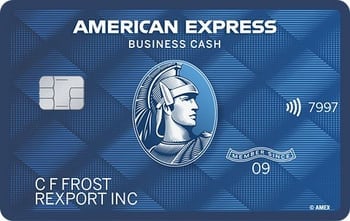Can I Use a Personal Credit Card for Business Expenses?
Technically yes, as long as you separate your business and personal finances. But business credit cards can be useful.

Many, or all, of the products featured on this page are from our advertising partners who compensate us when you take certain actions on our website or click to take an action on their website. However, this does not influence our evaluations. Our opinions are our own. Here is a list of our partners and here's how we make money.
You won’t break any rules by using a personal credit card for business expenses. But we recommend opting for a business credit card instead for two reasons:
- They’re designed for business use. They may offer higher credit limits and free employee cards. Plus, they can help you establish your business credit history.
- You can shield your personal credit. Most business credit cards don’t report all activity to consumer credit bureaus. That can help limit their impact on your personal credit score.
A consumer card may make more sense if you’re working on improving your personal credit and can’t qualify for a business credit card. They also offer more balance transfer options.
If you go that route, use the personal card only for business spending. Don’t put personal expenses on it. Separating your business and personal finances helps keep your books clean — and if your business is an LLC, it may help protect your assets if you’re ever sued.
Why should you use a business credit card?
Business credit cards are designed for business owners, so it follows that they offer features designed for entrepreneurs. These include:
- Higher credit limits. Credit limits will always vary from one borrower to another. But in general, business credit cards offer greater spending power. That can come in handy if you find yourself in a pinch and need to pay a few invoices while waiting for more cash to come in.
- Rewards specific to business spending. Some cash-back business credit cards tailor their bonus categories to business needs, like internet and cell phone bills, office supplies, business consulting services and even online advertising. Consumer credit cards are more likely to offer bonus rewards on categories like groceries. Both types of cards have options with high rewards rates on gas and dining, though.
- A business credit history. Your business has business credit scores that work similar to your personal credit scores. When you use a business credit card, your activity is reported to business credit bureaus. Eventually your business develops its own credit history. Your future business partners may check your business credit report to make sure you’ve made past payments on time.
- Expense management tools. Business cards may come with built-in software to help with bookkeeping tasks like uploading receipts and matching them to transactions. That saves you a step when you're syncing your card to your accounting software.
- Free employee cards with spending controls. Some consumer cards require you to pay a fee for additional cards and authorized users. Most business cards, on the other hand, offer large numbers of employee cards for free. The account holder can even monitor the use of each card and set restrictions on when and how the card is used.
Credit score impact of business vs. personal cards
Most business credit cards affect your personal credit score differently than personal cards do. That should factor into whether you decide to use a personal card for your business or not.
| Personal credit cards | Business credit cards | |
| What activity do they report to consumer credit bureaus? |
|
|
| Does use count toward your credit utilization? |
|
|
Capital One business credit cards are a notable exception to these rules. It reports all card activity to consumer bureaus for most of its cards. If you have the Capital One Spark Cash Plus or the Capital One Venture X Business, though, Capital One shares only negative repayment info (like most other card issuers).
But in general, using a business credit card helps protect your personal credit score from fluctuations in your business finances. You’ll still have to sign a personal guarantee for a business credit card, though. If your business can’t pay the bill, you’ll be on the hook personally.
Subscribe for grant opportunities, product recommendations and no-nonsense advice from the Nerds.
SUBSCRIBE FOR FREE 
When to consider using a personal credit card for your business
There are a few things business credit cards don’t do very well. If you’re in one of these situations, a personal card may be a better fit:
- Your personal credit history is lacking. There are only a handful of secured business credit cards. So if you have bad credit (typically considered a FICO score below 630) or fair credit (a FICO score between 630 and 689), you won’t have many business credit card options. It may be wise to open a personal credit card designed to build your credit. If your credit improves, you can apply for a business card in the future.
- You want to transfer balances. Balance transfer business credit cards are pretty limited, too. If you want to transfer business credit card debt onto a card with more favorable terms and pay it off over time, a personal balance transfer credit card with a 0% APR intro period may be your best bet.
- You won’t charge very much. If your business expenses are relatively low — if it’s a side hustle, for instance — the advantages that business cards offer may not be worth much to you. And you’ll probably have a better shot at earning a credit card welcome bonus on a personal card, since those tend to require less spending.
How to protect yourself if you use a personal card for your business
If you decide to use a personal credit card for your business, take these steps to track your expenses:
- Use the card only for business expenses. Use a different card for your personal spending. This is especially important if your business is an LLC. If you comingle your business and personal expenses, you could put your limited liability protections at risk.
- Sync your transactions with your accounting software. Mixing your personal and business expenses can complicate your accounting. Make sure personal spending doesn’t show up as business spending. Upload receipts when you can in case you’re ever audited.
- Watch your credit utilization. Business expenses can add up. To protect your personal credit score, try to use less than 30% of your available credit at any given time. Spending on your business could push you past that threshold and impact your credit score.
Article sources
NerdWallet writers are subject matter authorities who use primary,
trustworthy sources to inform their work, including peer-reviewed
studies, government websites, academic research and interviews with
industry experts. All content is fact-checked for accuracy, timeliness
and relevance. You can learn more about NerdWallet's high
standards for journalism by reading our
editorial guidelines.







